Rectal Bleeding & Hemorrhoids
- Quick Relief for Rectal Bleeding at NextGen Walk-in Clinic.
- Comprehensive Care for Rectal Bleeding – Visit NextGen Today.
- Expert Diagnosis and Treatment for Rectal Bleeding at NextGen.
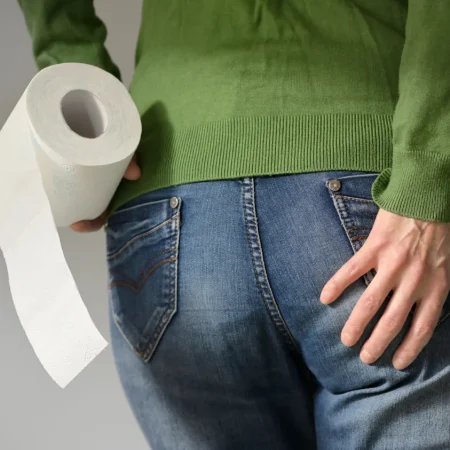
Rectal Bleeding & Hemorrhoids
- Quick Relief for Rectal Bleeding at NextGen Walk-in Clinic.
- Comprehensive Care for Rectal Bleeding – Visit NextGen Today.
- Expert Diagnosis and Treatment for Rectal Bleeding at NextGen.

Fast, Same-Day Care
Get quick, reliable treatment for conditions like rectal bleeding, without waiting for an appointment, ensuring timely relief.
Comprehensive Diagnostics
Receive expert evaluations and diagnostic tests, with referrals to specialists for accurate, effective treatment tailored to your needs.
Expert Medical Staff
Our experienced team offers personalized care, providing immediate relief and thorough treatment from diagnosis to recovery.
Affordable and Convenient
Skip the long ER wait times. We offer cost-effective care with extended hours and walk-in availability for your convenience.
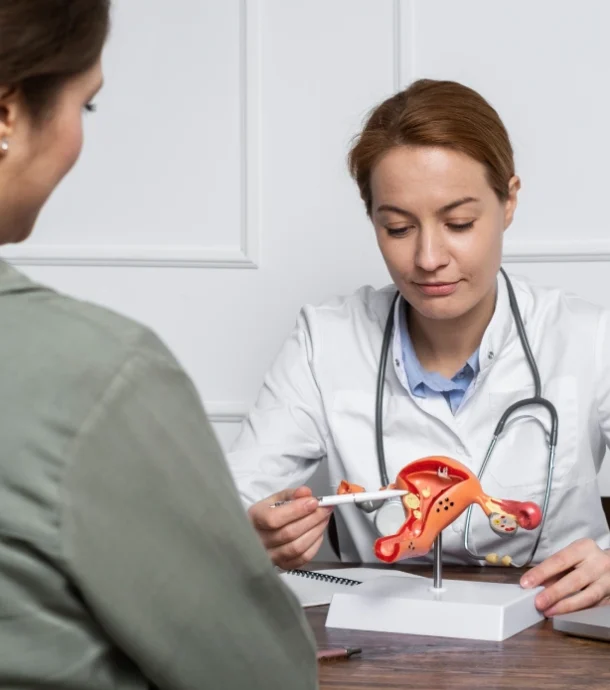
Causes, Symptoms, Treatment & How NextGen Can Help
Rectal bleeding is a common yet concerning symptom that many individuals may experience at some point in their lives. While it can be caused by a variety of conditions, one of the most frequent culprits is hemorrhoids. Hemorrhoids are swollen blood vessels in the rectum or anus that can cause discomfort, itching, and, in some cases, bleeding. Though hemorrhoids are often benign, it’s essential to determine the underlying cause of rectal bleeding to ensure proper treatment and avoid more serious conditions.
At NextGen Walk-in Clinic & Urgent Care, we understand the anxiety that can accompany symptoms like rectal bleeding, and we are committed to providing timely, expert care. Whether your symptoms are caused by hemorrhoids, gastrointestinal issues, or another condition, our healthcare professionals are here to help you find relief and get back to feeling your best.
Here, we will explore the causes, symptoms, and treatment options for rectal bleeding and hemorrhoids, and how NextGen can help you manage your condition with care and precision.
Diet and Rectal Bleeding: How Food Affects Your Health
Diet plays a crucial role in digestive health, and the foods you consume can significantly impact the occurrence of rectal bleeding, including conditions like hemorrhoids, anal fissures, and gastrointestinal disorders. A balanced diet can help prevent or reduce the severity of these conditions, while certain foods may exacerbate symptoms or contribute to the development of rectal bleeding.
• Low-Fiber Foods: A diet low in fiber can lead to constipation, which results in straining during bowel movements. This strain puts pressure on blood vessels in the rectum and anus, leading to the formation of hemorrhoids or worsening existing ones. Foods such as processed meats, refined grains, and sugary snacks should be eaten in moderation.
• Spicy Foods: While not directly causing rectal bleeding, spicy foods may irritate the gastrointestinal tract, leading to discomfort and inflammation. This irritation could aggravate existing hemorrhoids or anal fissures, leading to bleeding.
• Alcohol: Excessive alcohol consumption can cause dehydration and irritation in the intestines, making stools harder to pass. It can also affect blood circulation, leading to the enlargement of hemorrhoidal veins and increased bleeding risk.
• Caffeine: Caffeinated beverages like coffee and energy drinks can lead to dehydration, which results in constipation and harder stools. This increases the likelihood of straining and further aggravating hemorrhoids or causing anal fissures.
1. High-Fiber Foods: A fiber-rich diet helps keep the digestive system moving efficiently and prevents constipation, reducing the need to strain during bowel movements. Foods like fruits, vegetables, whole grains, legumes, and oats are great sources of fiber and can help soften stools, reducing pressure on the rectal area.
2. Water and Hydrating Fluids: Proper hydration is essential to prevent constipation and ease the passage of stools. Drinking plenty of water and hydrating beverages like herbal teas helps soften stool and prevent strain, reducing the risk of hemorrhoids and fissures.
3. Healthy Fats: Foods rich in omega-3 fatty acids, such as fatty fish (salmon, mackerel), flaxseeds, and walnuts, have anti-inflammatory properties. These healthy fats can help reduce inflammation in the digestive tract, which may provide relief from hemorrhoids and other gastrointestinal conditions.
4. Probiotic-Rich Foods: Incorporating probiotic foods such as yogurt, kefir, kimchi, and sauerkraut can promote gut health and improve digestion. A healthy gut can reduce inflammation and support regular bowel movements, potentially preventing conditions that lead to rectal bleeding.


Stress and Gastrointestinal Issues
Stress can significantly impact your digestive system, leading to various gastrointestinal problems. When stressed, the body produces higher levels of cortisol, which can affect the function of the stomach and intestines. This can result in conditions like irritable bowel syndrome (IBS), inflammatory bowel disease (IBD), and even hemorrhoids.
Stress can cause increased gut motility, leading to diarrhea or constipation, which can strain the rectal area and lead to bleeding. Moreover, prolonged stress can weaken the immune system, making the body more susceptible to infections that could cause gastrointestinal bleeding. Managing stress through relaxation techniques, regular exercise, and healthy coping mechanisms can help prevent stress-induced gastrointestinal issues, including rectal bleeding.
Overview of Rectal Bleeding:
Rectal bleeding refers to any bleeding that occurs from the rectum or anus, which may appear as blood in the stool, on toilet paper, or in the toilet bowl. The color of the blood can vary, with bright red blood often indicating bleeding from the lower gastrointestinal tract, such as the rectum or anus, while darker blood may suggest bleeding from higher up in the digestive system.
While rectal bleeding can be concerning, it’s important to remember that it can have various causes. Some conditions, such as hemorrhoids, are benign and treatable, while others may point to more serious health concerns like gastrointestinal disorders or even colorectal cancer. Understanding the causes of rectal bleeding is essential for determining the appropriate course of action and treatment.
• Rectal bleeding can appear as blood in the stool, on toilet paper, or in the toilet bowl.
• The color of the blood provides clues about the source of the bleeding.
• Causes range from benign conditions like hemorrhoids to more serious conditions such as colorectal cancer.
• If you notice rectal bleeding or other concerning symptoms, it's important to seek medical attention. NextGen Walk-in Clinic & Urgent Care is here to provide fast, expert care for gastrointestinal concerns. Our healthcare professionals can assess your symptoms, provide accurate diagnoses, and offer treatment options tailored to your needs. Don’t wait — schedule an appointment with us today to ensure your health and peace of mind.
- Hemorrhoids:
Hemorrhoids are swollen blood vessels in the rectum or anus that can cause discomfort, itching, and, in some cases, bleeding. They are one of the most common causes of rectal bleeding, often triggered by straining during bowel movements, chronic constipation, or pregnancy. The bleeding usually appears as bright red blood on the toilet paper or in the stool. - Anal Fissures:
Anal fissures are small tears or cracks in the skin around the anus, often caused by passing large, hard stools or straining during bowel movements. These fissures can be extremely painful and may lead to bright red blood, typically visible on the toilet paper or in the toilet bowl. - Gastrointestinal Disorders:
Certain gastrointestinal conditions can lead to rectal bleeding, such as:- Diverticulosis: Small pouches that form in the colon, which can become inflamed or infected, causing bleeding.
- Inflammatory Bowel Disease (IBD): Conditions like Crohn's disease and ulcerative colitis cause chronic inflammation of the digestive tract, which can result in rectal bleeding.
- Colorectal Cancer: A more serious cause of rectal bleeding, often characterized by changes in bowel habits and weight loss along with bleeding.
- Gastrointestinal Infections: Bacterial infections, such as those caused by Salmonella or E. coli, can irritate the intestinal lining and cause bleeding.
- Diverticulosis: Small pouches that form in the colon, which can become inflamed or infected, causing bleeding.
- Trauma or Injury:
Physical trauma to the anal area, such as vigorous wiping, anal intercourse, or heavy lifting, can lead to bleeding. Any injury that breaks the skin around the anus may result in blood appearing in the stool or on the toilet paper. - Infections:
Certain infections, especially sexually transmitted diseases (STDs) like gonorrhea, chlamydia, or syphilis, can cause inflammation and irritation in the rectal area, potentially leading to rectal bleeding. Bacterial infections that cause gastrointestinal distress can also contribute to this issue.
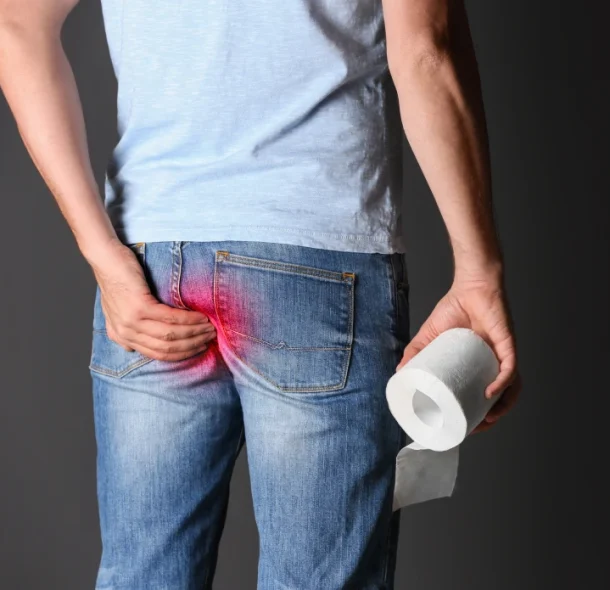

Symptoms of Rectal Bleeding
- Bright Red Blood: When blood appears bright red, it typically indicates that the source of the bleeding is in the lower part of the digestive tract, such as the rectum or anus. This is commonly seen with hemorrhoids and anal fissures.
- Dark Red or Black Stool: If the stool is dark red or black, this suggests that the bleeding is coming from a higher part of the digestive tract, such as the stomach, small intestine, or colon. The blood has had more time to oxidize as it travels through the digestive system.
- Pain and Discomfort: Hemorrhoids and anal fissures are often associated with pain, itching, or discomfort around the anus. This pain is typically felt during or after a bowel movement and can be sharp or burning in nature.
- Swelling or Protrusion: Hemorrhoids may cause visible lumps or bulges around the anal area, which can be felt or seen. These swollen blood vessels can become irritated, inflamed, and painful, leading to further discomfort during bowel movements.
Treatment for Rectal Bleeding
• Warm Sitz Baths: Soaking in a warm sitz bath can provide immediate relief for conditions like hemorrhoids and anal fissures. The warm water helps to soothe the affected area, reduce inflammation, and promote healing. Sit in a shallow bath with warm water for about 15-20 minutes, several times a day, especially after bowel movements.
• Fiber-Rich Diet: A fiber-rich diet is essential for maintaining soft stools and preventing constipation. Eating foods like fruits, vegetables, whole grains, and legumes can help prevent straining during bowel movements, which is a common cause of rectal bleeding. Adequate fiber intake can also promote regular bowel movements and reduce the risk of developing hemorrhoids and anal fissures.
• Topical Creams and Ointments: Over-the-counter creams and ointments, such as hydrocortisone creams or witch hazel pads, can help reduce inflammation, itching, and discomfort associated with hemorrhoids. These topical treatments can also provide temporary relief from pain and irritation, allowing the affected area to heal.
1. Stool Softeners:
To avoid constipation and strain during bowel movements, stool softeners may be prescribed by your doctor. These medications work by making the stool softer and easier to pass, which can help prevent further irritation of hemorrhoids or fissures.
2. Prescription Medications:
For more severe cases of hemorrhoids or fissures, your doctor may prescribe stronger medications, such as topical corticosteroids or pain-relieving ointments. These medications work to reduce inflammation and promote faster healing.
1. Rubber Band Ligation:
Rubber band ligation is a minimally invasive procedure commonly used to treat internal hemorrhoids. During this procedure, a small rubber band is placed around the base of the hemorrhoid, cutting off its blood supply. The hemorrhoid eventually shrinks and falls off within a few days.
2. Surgical Removal:
In cases of severe hemorrhoids or persistent anal fissures that do not respond to other treatments, surgical removal may be necessary. This may involve the removal of the hemorrhoid (hemorrhoidectomy) or the repair of a chronic anal fissure. Surgery is typically reserved for cases where other treatments have failed.
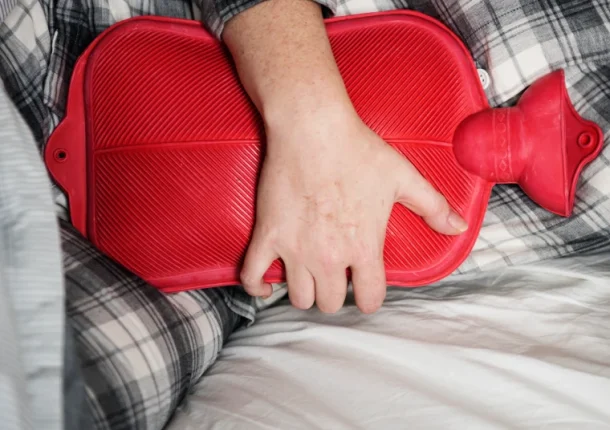
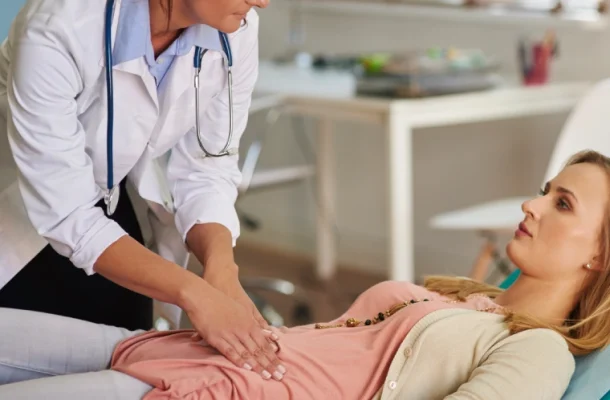
When to Seek Medical Help
• Continuous or Heavy Bleeding: If rectal bleeding persists or you notice a significant amount of blood loss, it’s essential to consult a healthcare provider. Heavy or continuous bleeding may indicate a more serious condition, and timely medical intervention is crucial.
• Severe Pain: If you experience intense pain that prevents you from carrying out normal activities, this may be a sign of a more severe underlying condition. Severe pain could be related to large hemorrhoids, infected anal fissures, or other gastrointestinal disorders.
• Additional Symptoms: If rectal bleeding is accompanied by symptoms like blood mixed with stool, weight loss, fatigue, or changes in bowel habits, it is important to seek immediate medical attention. These symptoms may indicate conditions such as colorectal cancer, inflammatory bowel disease (IBD), or gastrointestinal infections that require a thorough evaluation.
1. Stool Softeners:
To avoid constipation and strain during bowel movements, stool softeners may be prescribed by your doctor. These medications work by making the stool softer and easier to pass, which can help prevent further irritation of hemorrhoids or fissures.
2. Prescription Medications:
For more severe cases of hemorrhoids or fissures, your doctor may prescribe stronger medications, such as topical corticosteroids or pain-relieving ointments. These medications work to reduce inflammation and promote faster healing.
1. Rubber Band Ligation:
Rubber band ligation is a minimally invasive procedure commonly used to treat internal hemorrhoids. During this procedure, a small rubber band is placed around the base of the hemorrhoid, cutting off its blood supply. The hemorrhoid eventually shrinks and falls off within a few days.
2. Surgical Removal:
In cases of severe hemorrhoids or persistent anal fissures that do not respond to other treatments, surgical removal may be necessary. This may involve the removal of the hemorrhoid (hemorrhoidectomy) or the repair of a chronic anal fissure. Surgery is typically reserved for cases where other treatments have failed.
How NextGen Walk-in Clinic & Urgent Care Can Help
When you visit NextGen Walk-in Clinic & Urgent Care, our first step in addressing rectal bleeding is conducting a thorough physical examination and reviewing your medical history. This helps us identify the potential causes of the bleeding, whether it’s due to hemorrhoids, anal fissures, gastrointestinal disorders, or other factors.
To further understand the condition, we may recommend diagnostic tests, such as stool samples or blood tests, which help pinpoint the cause of bleeding. If necessary, we may refer you for advanced imaging procedures like colonoscopies or endoscopies, ensuring that we provide a comprehensive diagnosis and treatment plan.
We aim to offer fast and effective relief from the discomfort associated with rectal bleeding. NextGen Walk-in Clinic & Urgent Care provides prescriptions for pain relief, topical treatments for hemorrhoids, and stool softeners to ease symptoms. These treatments help to reduce inflammation, soothe pain, and make bowel movements easier, bringing you comfort quickly.
In certain cases, hemorrhoids or anal fissures may require more specialized care. If necessary, we can refer patients to specialists for advanced treatment options. Additionally, our clinic offers minor in-office procedures for hemorrhoids and fissures that can help resolve symptoms and prevent further complications, allowing you to feel better in a short amount of time.
Prevention is an important aspect of managing rectal bleeding. At NextGen Walk-in Clinic & Urgent Care, we provide expert advice on lifestyle changes that can help reduce the risk of future issues. Our healthcare providers offer dietary guidance, such as increasing fiber intake, and educate patients on healthy bowel habits. We also emphasize the importance of avoiding strain during bowel movements, which can prevent hemorrhoids and other complications.
After your initial treatment, we ensure continuous care through follow-up consultations. Our team will monitor your progress and provide additional treatment options if necessary. We’re committed to your ongoing health and well-being, ensuring that your condition improves and that you get the long-term relief you need.


Prevention of Rectal Bleeding
One of the most effective ways to prevent rectal bleeding is by maintaining a healthy diet that promotes proper digestion. At NextGen Walk-in Clinic & Urgent Care, we recommend increasing fiber intake through fruits, vegetables, and whole grains. Fiber helps to soften stools, reduce constipation, and prevent the strain that can lead to hemorrhoids and anal fissures.
Staying hydrated is key to maintaining healthy bowel movements. Drinking plenty of water helps to keep the stool soft and makes it easier to pass, reducing the risk of straining during bowel movements. Hydration is a simple yet effective way to promote overall digestive health.
Maintaining proper hygiene is essential in preventing irritation around the anus. Gently cleaning the anal area after bowel movements and avoiding harsh wiping can help reduce the risk of hemorrhoids and fissures. We advise patients to use mild wipes or warm water to keep the area clean without causing irritation.
Straining during bowel movements is one of the primary causes of hemorrhoids and anal fissures. NextGen Walk-in Clinic & Urgent Care emphasizes the importance of addressing constipation promptly. If needed, we recommend stool softeners or other medications to help make bowel movements easier and avoid the need to strain.
Customer Reviews for NextGen Walk-in Clinic & Urgent Care

Jeffrey R.
Lorem ipsum dolor sit amet, consectetur adipiscing elit. Praesent tincidunt tortor at tempor auctor. Fusce venenatis euismod eros eget ullamcorper. Aliquam fermentum dignissim metus vel maximus. Integer quis tempor sem. Mauris placerat fermentum ornare. Nam vestibulum hendrerit purus eget auctor. Aliquam erat volutpat.

Chris J.
Lorem ipsum dolor sit amet, consectetur adipiscing elit. Praesent tincidunt tortor at tempor auctor. Fusce venenatis euismod eros eget ullamcorper. Aliquam fermentum dignissim metus vel maximus. Integer quis tempor sem. Mauris placerat fermentum ornare. Nam vestibulum hendrerit purus eget auctor. Aliquam erat volutpat.

Cora P.
Lorem ipsum dolor sit amet, consectetur adipiscing elit. Praesent tincidunt tortor at tempor auctor. Fusce venenatis euismod eros eget ullamcorper. Aliquam fermentum dignissim metus vel maximus. Integer quis tempor sem. Mauris placerat fermentum ornare. Nam vestibulum hendrerit purus eget auctor. Aliquam erat volutpat.
Frequently Asked Questions (FAQs) About Rectal Bleeding & Hemorrhoids
Lorem Ipsum is simply dummy text of the printing and typesetting industry. Lorem Ipsum has been the industry's standard dummy text ever since the 1500s, when an unknown printer took a galley of type and scrambled it to make a type specimen book. It has survived not only five centuries, but also the leap into electronic typesetting, remaining essentially unchanged. It was popularised in the 1960s with the release of Letraset sheets containing Lorem Ipsum passages, and more recently with desktop publishing software like Aldus PageMaker including versions of Lorem Ipsum.
Lorem Ipsum is simply dummy text of the printing and typesetting industry. Lorem Ipsum has been the industry's standard dummy text ever since the 1500s, when an unknown printer took a galley of type and scrambled it to make a type specimen book. It has survived not only five centuries, but also the leap into electronic typesetting, remaining essentially unchanged. It was popularised in the 1960s with the release of Letraset sheets containing Lorem Ipsum passages, and more recently with desktop publishing software like Aldus PageMaker including versions of Lorem Ipsum.
Lorem Ipsum is simply dummy text of the printing and typesetting industry. Lorem Ipsum has been the industry's standard dummy text ever since the 1500s, when an unknown printer took a galley of type and scrambled it to make a type specimen book. It has survived not only five centuries, but also the leap into electronic typesetting, remaining essentially unchanged. It was popularised in the 1960s with the release of Letraset sheets containing Lorem Ipsum passages, and more recently with desktop publishing software like Aldus PageMaker including versions of Lorem Ipsum.
Lorem Ipsum is simply dummy text of the printing and typesetting industry. Lorem Ipsum has been the industry's standard dummy text ever since the 1500s, when an unknown printer took a galley of type and scrambled it to make a type specimen book. It has survived not only five centuries, but also the leap into electronic typesetting, remaining essentially unchanged. It was popularised in the 1960s with the release of Letraset sheets containing Lorem Ipsum passages, and more recently with desktop publishing software like Aldus PageMaker including versions of Lorem Ipsum.
Lorem Ipsum is simply dummy text of the printing and typesetting industry. Lorem Ipsum has been the industry's standard dummy text ever since the 1500s, when an unknown printer took a galley of type and scrambled it to make a type specimen book. It has survived not only five centuries, but also the leap into electronic typesetting, remaining essentially unchanged. It was popularised in the 1960s with the release of Letraset sheets containing Lorem Ipsum passages, and more recently with desktop publishing software like Aldus PageMaker including versions of Lorem Ipsum.
Lorem Ipsum is simply dummy text of the printing and typesetting industry. Lorem Ipsum has been the industry's standard dummy text ever since the 1500s, when an unknown printer took a galley of type and scrambled it to make a type specimen book. It has survived not only five centuries, but also the leap into electronic typesetting, remaining essentially unchanged. It was popularised in the 1960s with the release of Letraset sheets containing Lorem Ipsum passages, and more recently with desktop publishing software like Aldus PageMaker including versions of Lorem Ipsum.
Lorem Ipsum is simply dummy text of the printing and typesetting industry. Lorem Ipsum has been the industry's standard dummy text ever since the 1500s, when an unknown printer took a galley of type and scrambled it to make a type specimen book. It has survived not only five centuries, but also the leap into electronic typesetting, remaining essentially unchanged. It was popularised in the 1960s with the release of Letraset sheets containing Lorem Ipsum passages, and more recently with desktop publishing software like Aldus PageMaker including versions of Lorem Ipsum.
Lorem Ipsum is simply dummy text of the printing and typesetting industry. Lorem Ipsum has been the industry's standard dummy text ever since the 1500s, when an unknown printer took a galley of type and scrambled it to make a type specimen book. It has survived not only five centuries, but also the leap into electronic typesetting, remaining essentially unchanged. It was popularised in the 1960s with the release of Letraset sheets containing Lorem Ipsum passages, and more recently with desktop publishing software like Aldus PageMaker including versions of Lorem Ipsum.
Rectal Bleeding: Diagnosis, Treatment & Prevention at NextGen Walk-in Clinic
If you’re experiencing rectal bleeding or related symptoms, it’s important to seek medical care as soon as possible. Don’t wait for your symptoms to worsen. NextGen Walk-in Clinic & Urgent Care is here to provide you with fast, reliable diagnosis and treatment options. Our experienced team is ready to help you find relief and get you back to feeling your best.
Contact us today to schedule an appointment and take the first step toward addressing your concerns. Let NextGen Walk-in Clinic & Urgent Care support you in your journey to better health.

